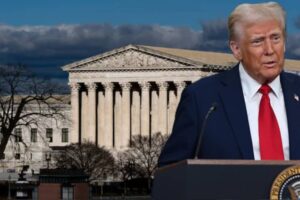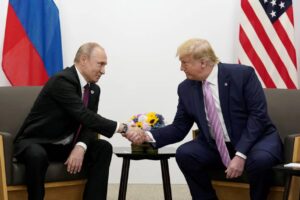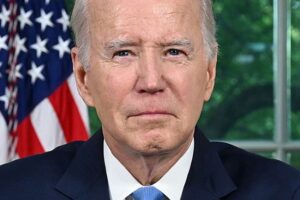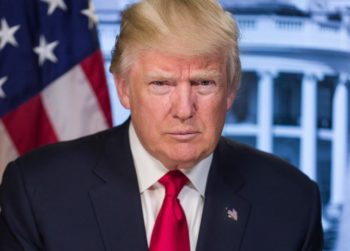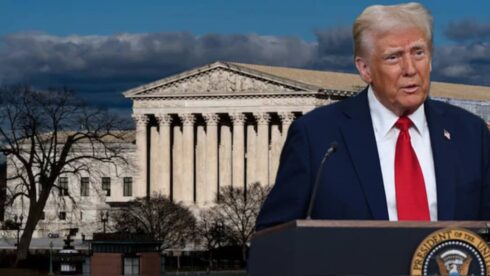In a surprising turn of events, former President and Republican presidential candidate Donald Trump has announced his desire for all remaining Bitcoin to be mined in the United States. During a meeting on Tuesday with executives from Nasdaq-listed bitcoin mining firms CleanSpark Inc. and Riot Platforms, Trump emphasized the strategic importance of this move. “Bitcoin mining may be our last line of defense against a central bank digital currency (CBDC),” Trump stated, highlighting his concern over the rise of centralized digital currencies.
Trump’s remarks, shared via a late-night post on the social media platform Truth Social, reflect a broader vision for America’s energy policy. “Biden’s hatred of Bitcoin only helps China, Russia, and the Radical Communist Left. We want all the remaining Bitcoin to be MADE IN THE USA!!! It will help us be ENERGY DOMINANT,” he proclaimed. This statement underscores his belief that increasing U.S.-based Bitcoin mining could enhance national energy security and counter foreign influence.
Strategic Shift Towards Energy Independence
Trump’s advocacy for domestic Bitcoin mining aligns with his long-standing emphasis on energy independence. He argues that fostering a robust Bitcoin mining industry within the U.S. could stabilize the national energy grid and make better use of local resources. This perspective positions Bitcoin mining not just as a financial opportunity, but as a critical component of national energy strategy.
Currently, major Bitcoin mining operations are concentrated in regions such as China, Central Asia, El Salvador, and parts of Europe, including Germany. By shifting this focus to the United States, Trump believes that the country can mitigate external risks and leverage Bitcoin mining to achieve greater energy self-sufficiency. This approach suggests a dual benefit: promoting technological advancement while simultaneously addressing energy policy goals.
Trump Meeting with Industry Leaders
Trump’s engagement with key industry leaders highlights his proactive approach to this issue. At a Mar-a-Lago event, he met with executives from CleanSpark Inc. and Riot Platforms, two prominent players in the Bitcoin mining sector. These discussions likely centered on how U.S. companies can expand their mining operations and utilize domestic resources more effectively.
During the meeting, Trump reportedly emphasized the role of Bitcoin miners in stabilizing the energy grid, suggesting that their activities could contribute to a more resilient and reliable power supply. This viewpoint aligns with broader trends in the energy sector, where integrating cryptocurrency mining with renewable energy sources is seen as a way to balance demand and supply effectively. By fostering closer ties with industry leaders, Trump aims to lay the groundwork for a robust, U.S.-based Bitcoin mining infrastructure.
Donald Trump’s recent statements and actions reveal a strategic vision that intertwines Bitcoin mining with national energy policy and economic security. By advocating for all remaining Bitcoin to be mined in the U.S., he seeks to position the country as a global leader in both cryptocurrency and energy independence. ::Unpacking the Claims:
Energy Dominance and National Security
Trump’s assertion that domestic bitcoin mining will contribute to U.S. “energy dominance” has raised questions, particularly given the substantial energy requirements of bitcoin mining. The process, which involves complex computational tasks, has been estimated to consume up to 2.3% of the nation’s electricity as of 2023. Critics argue that this level of consumption contradicts any claims of energy production or dominance. It is possible that Trump is referring to regulatory control over energy sources rather than the actual generation of energy through mining activities.
Furthermore, Trump’s national security arguments are somewhat ambiguous. He contends that Biden’s alleged disdain for bitcoin aids U.S. adversaries such as China and Russia, as well as domestic “Radical Communist Left” elements. However, the linkage between embracing cryptocurrency and bolstering national security is unclear. Bitcoin’s anonymity and potential for misuse in illegal activities complicate this narrative. Trump appears to be leveraging speculative fears about CBDCs infringing on privacy to bolster his position, despite the complex reality of cryptocurrency’s impact on national security
Key Takeaways and Implications
Trump’s embrace of bitcoin mining as a political tool introduces new dynamics into the 2024 election landscape. His call for domestic bitcoin mining not only highlights a shift in his policy stance but also raises important questions about energy consumption, national security, and regulatory approaches to digital currencies. As the debate over cryptocurrency continues to evolve, Trump’s position may influence broader discussions about the future of digital assets in the United States.



